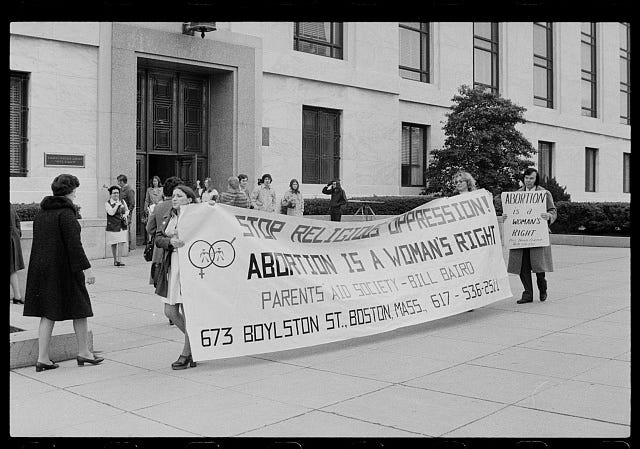Congress has attempted to ban abortion before
Orrin Hatch and other Republicans sought to pass Human Life Amendments after Roe v. Wade
(Protests outside an abortion amendment hearing in 1974. Photo found in the Library of Congress Prints & Photographs division)
For younger women, it may shock them to watch Congress attempt to pass federal bans on abortion. But for older women, they’ve seen this before.
Congress made several attempts to pass a human life amendment In the years after Roe established the right to an abortion. Each time it failed because representatives in swing districts feared alienating voters by supporting it.
The Christian Right had galvanized in the late 1970s in opposition to President Jimmy Carter’s reluctance to condemn feminism and gay rights. Carter was no champion of abortion rights, but Republican strategists saw the issue as something they could use to make evangelicals vote for Ronald Reagan, who himself was not devout. Paul Weyrich and his allies helped make the issue a focus of Republican politics.
On the eve of the 1980 election that was a Republican landslide, evangelical leader Jerry Falwell said the first action of the congress would be the passage of an amendment establishing fetal personhood.
Orrin Hatch, the Senator from Utah, was the most famous supporter of the effort. He pushed for it in the early 1980s. There were various attempts at passing what became known as the Hatch Amendment. The Senator withdrew his amendment later on. Most on the abortion rights side felt it was a concession that most of the country opposed the antiabortion movement.
The effort failed as a result of collaboration between many feminist groups. What often happens in any movement are rivalries for power within their own ranks. That’s true of both Republican and Democratic politics as the potential standard-bearers and those who have their ear compete for a greater say in what direction to take. But with the common threat, most major feminists circled their wagons to deal with the challenges put forth by the other side.
In 1983, the Senate rejected S.J. Resolution 3, which was an amendment that was designed to eliminate the protections granted by the Supreme Court.
Fredrica Hodges, who headed the Religious Coalition for Abortion Rights at the time, pointed out that the pro-choice position was a politically appealing one instead of a liability.
“It was most distressing to observe the real lack of faith Senator Hatch and his supporters have in the individual American woman’s ability to make moral decisions,” Hodges said. “They obviously believe that only government knows best. It is also strange to hear them argue that the family would be strengthened by government-coerced childbearing.”
Knowing this part of history will help younger feminist leaders realize how teamwork and good communication can thwart efforts to curb abortion access.




